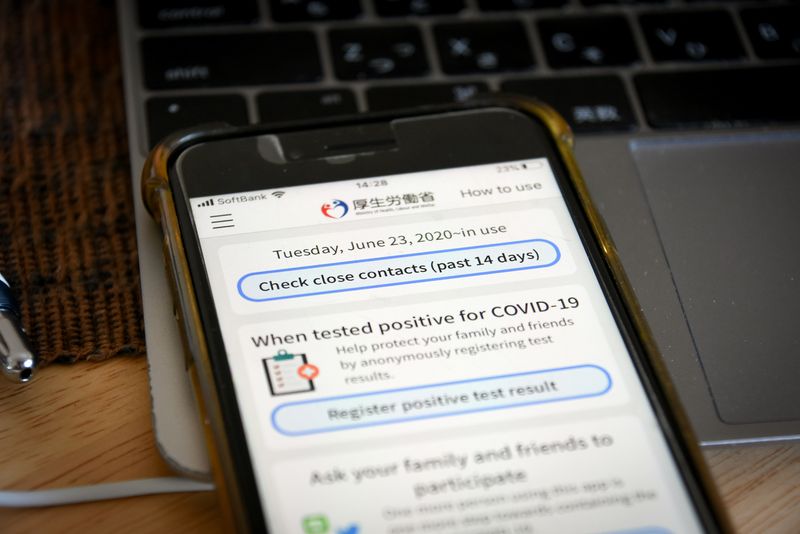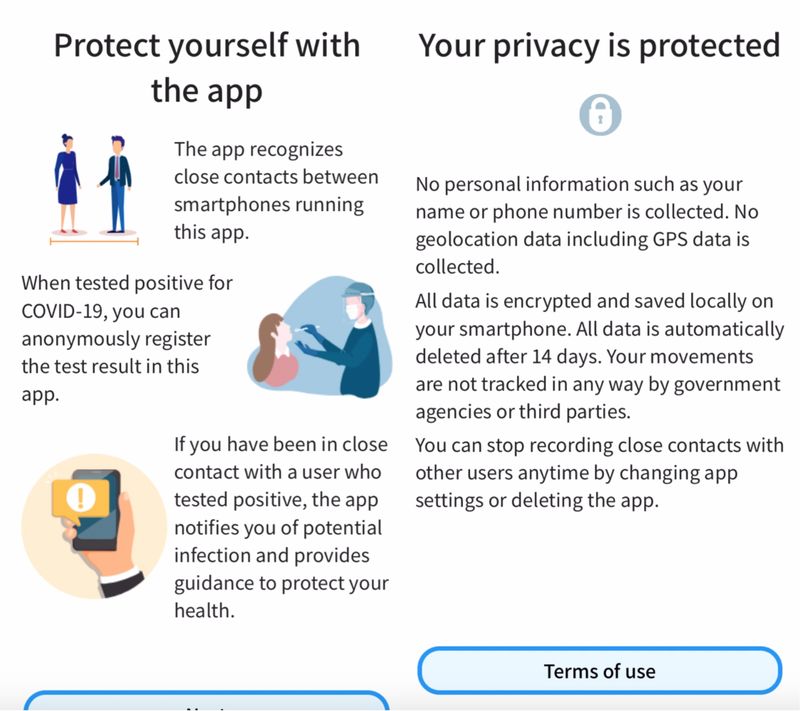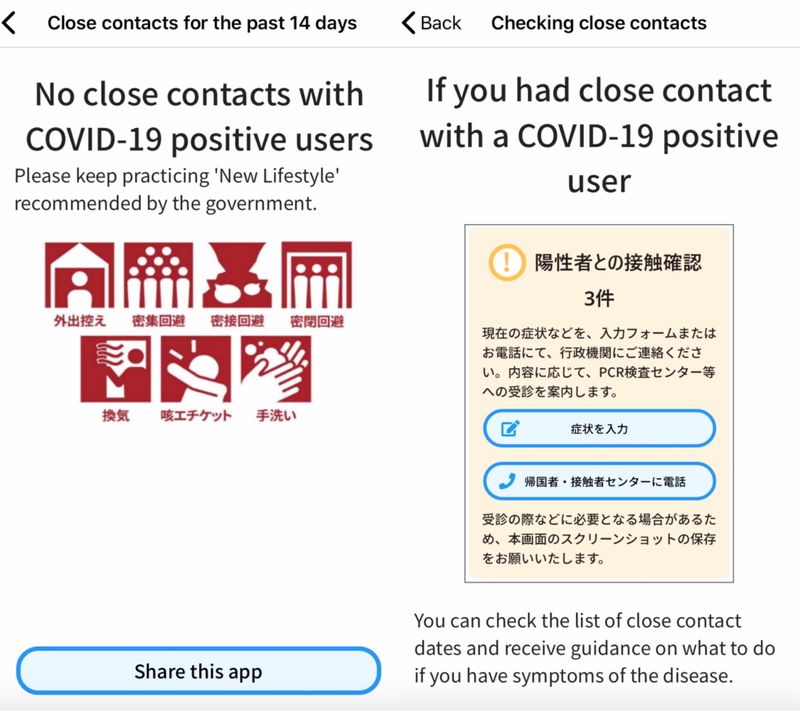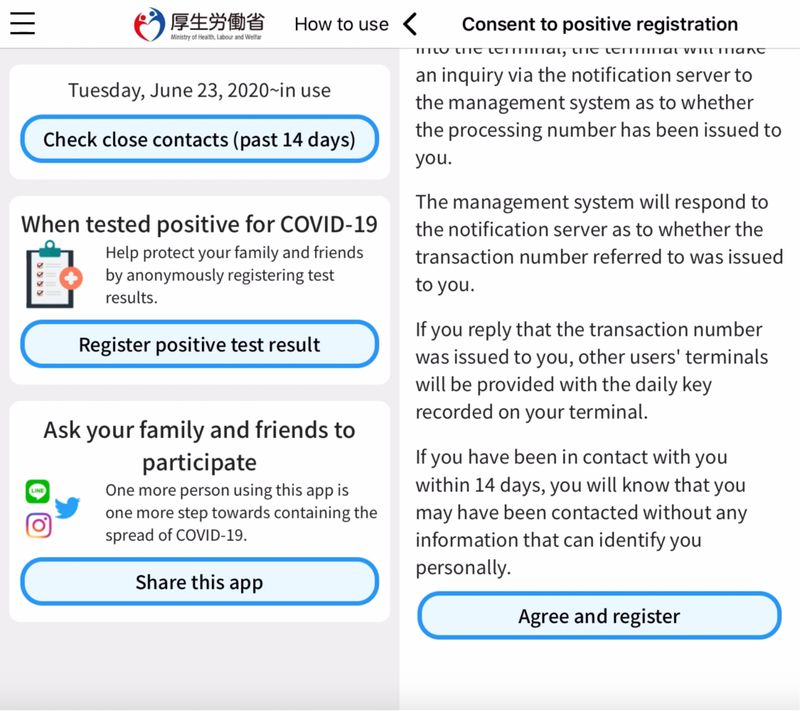Jun 26, 2020
Japan gov’t coronavirus contact-tracing app COCOA

The Japanese government launched a coronavirus contact tracing app on Friday June 19 in an effort to keep in check new cases of the Covid-19-causing novel coronavirus after easing social, economic and travel restrictions across Japan.
Once week into a month-long trail period and the app has received over 4,300,000 downloads.
The app, named COVID-19 Contact-Confirming Application, comes under the abbreviation COCOA. Run by Japan’s Ministry of Health, Labor, and Welfare, the app alerts users when they have been in close proximity with other application users who have tested positive for the new coronavirus.
“Close contact,” according to the makers, is determined as users being within a distance of one meter of each other for 15 mins or more. If within two weeks a user tests positive for the virus and records this in their app, other app holders with whom they have been in close contact will be notified along with the date of that contact. No personal or location information will be revealed.
If no infection is recorded, contact records will automatically be deleted after 14 days.
Users register positive test results by entering a "processing number," assigned to them by health authorities at the time of testing, into the app.
As of Tuesday, June 23, the COCOA app had received over 3,900,000 downloads. On the same day however the ministry temporarily shut down the app in order to address issues that included acceptance of processing numbers not issued by health authorities. An updated version of the app is expected to be ready in the next week, according to reports.
Nearly four million downloads of the app in just a few days might sound like a lot however research conducted by a team at the University of Oxford in the U.K., which simulated the use of a contact tracing app for use in combating the spread of the new coronavirus, suggested that around 60 percent of a country’s population would need to be using such an app in order to stop an epidemic. Although even with fewer users an app like this could still prove effective in reducing the number of infections and deaths, according to the researchers.
While the Ministry of Health, Labor and Welfare hasn’t issued any download targets for the app, those who have already downloaded it are encouraged to share it with family and friends.
“One more person using this app is one more step towards containing the spread of Covid-19,” reads a section of the COCOA app.
We downloaded the contact-tracing app on Tuesday, ahead of the temporary shut down.
Requirements for downloading and installing
iPhone users can download the COCOA app via the app store, iOS 13.5 or later, required.
Android users can download the app via Google Play, Android 6.0 or later, required. A page on the website of the Ministry of Health, Labor and Welfare lists other devices that can handle the download and installation of the app. https://www.mhlw.go.jp/stf/seisakunitsuite/bunya/cocoa_00138.html
Getting started
Getting started with the COCOA app couldn’t have been easier. There was no need to input any information, personal or otherwise, in order to use the app.
On Tuesday morning, Nippon Television Network’s morning “Sukkiri” new program reported the two main hurdles for Japanese people to download and use the COCOA app as being difficulty of use and concerns regarding privacy.
Japanese Prime Minister Shinzo Abe addressed the issue of privacy surrounding the app at a press conference ahead of COCOA’s launch.
"It does not collect personal data at all. People can use it without worry," said the prime minister.
In no way can this writer claim to be an expert in such a field, however, some digital commentators have described the working of the app being that which phones have come into contact, rather than people. With the app installed, devices “communicate” via Bluetooth and contact is recorded by the app in an encrypted state.
Use of the app does not require at any point for users to input private or personal information such as names, telephone numbers, and addresses.
“Your movements are not tracked in any way by government agencies or third parties.” - in-app text on the COCOA application addressing privacy concerns.
Privacy
Both the privacy policy and terms of use for the COCOA app are available in English from the homepage of the Ministry of Health, Labor and Welfare. Access them from the links below:
Privacy Policy: https://www.mhlw.go.jp/stf/seisakunitsuite/english_pp_00032.html
Terms of use: https://www.mhlw.go.jp/stf/seisakunitsuite/english_rk_00031.html
The same texts are available to read in the app itself.
While these documents don’t make for easy reading, the Privacy Policy does lay out fairly clearly what information is collected through the app by the ministry, and what information is not.
“The Ministry of Health, Labour and Welfare does not use the App to collect the App User’s name, date of birth, gender, address, telephone number, email address, device location information, or any other information which enables the App User to be personally identified,” reads a section of the privacy policy for the use of the COVID-19 Contact-Confirming Application run by Japan’s Ministry of Health, Labor and Welfare.
Upon deleting the app from devices in which it is installed “all information of the app recorded in that device will be irrecoverably deleted,” according to the ministry.
Access
Privacy to one side, an early issue with the COCOA app is finding. Typing “cocoa” into an App Store search didn’t reveal anything relevant, at the time of research. Typing in “covid-19 app Japan” does the trick.
As is often the case, the English-language version of the Ministry of Health, Labor and Welfare homepage offers nothing about the app. Even on the Japan site it isn’t given much prominence, although the sharp-eyed foreign observer might spot the update link detail news about the app.
To the best of our knowledge the ministry hasn’t offered any multi-lingual guidance about the COCOA app other than than in the app itself. (It should be noted that downloading and installing the app doesn’t immediately commit a user to begin tracing potential close contacts.)
Find links to COCOA on the App Store and Google Play below:
App Store: https://apps.apple.com/jp/app/id1516764458
Google Play: https://play.google.com/store/apps/details?id=jp.go.mhlw.covid19radar
Navigating the app
First of all, the text content of the app is available in English -- English which doesn’t read like a machine translation.
After opening the installed app for the first time, users are greeted with a very simple introduction to the workings and purpose of the app. They are then taken to a page about privacy matters where they are asked to accept the “Terms of Use” and agree to the app’s “Privacy Policy” (both detailed in English).

(Screenshot of COCOA app introductory page and privacy information)
The app requires Bluetooth to be switched on in order to record close contacts. The next screen enables users to do this. Users are then asked to turn on notifications in order to be notified when they have had close contact with users who have tested (and registered as) positive for Covid-19.
And that completed the setup of the COVID-19 Contact-Confirming Application.
How to use it
A “How to use” menu in the COCOA app address the topics of “What is a ‘close contact’?”, how to check the number of close contacts, what to do if you test positive for Covid-19 (in terms of using the app), and how to delete or stop recording close contact history.
As much as it’s possible to simplify how it is that two smartphone devices can communicate with one another, maybe the ministry does this. Or maybe it depends on how interested one is in such things or, indeed, one’s capacity to digest such information. Either way, the delivery of information is kept simple in this regard. Whether it is enough to strengthen a user’s trust is, well, up to the individual user.
Perhaps reassuringly, the app makes it clear how users can stop or delete the recording of close contacts.
A large button on the home screen leads users to check close contacts over the past 14 days. When there have been none, users are taken to the screen on the left below:

(Screenshots taken from the COCOA app - image on the right displays example of "close contact" notification)
According to the makers, upon being notified of close contact with a Covid-19-positive user, the app will also issue guidance on what to do if they are displaying symptoms. At this point it’s not clear if this “advice” is issued in languages other than Japanese. Certainly, the example of such a situation is provided in Japanese only at the time of writing.
A button on the app’s homepage takes users to a screen where they can learn how to register a positive test result. Prior to registering their “processing number,” an explanation is offered as to the relationship between this number, the authorities, the user and their device. Users are required to “agree” with this explanation before being able to register their positive test with the app.
“Registration is anonymous. You do not have to enter your name or any other personal information. No information regarding the location of close contact is recorded.” - In-app text on the COVID-19 Contact-Confirming Application when registering a positive test result.

(Screenshots from the COCOA app show home screen (left) and positive registration agreement (right))
Will you be using the contact-tracing app?
It’s likely that no matter how strong the appeals from makers and government to convince the public of their maintained privacy, there will be many people who can’t bring themselves to trust such technology. Perhaps younger generations, used to living a large chunk of their lives in the social-media open, will care less about the matters of privacy that have thus far surrounded the COCOA app.
Nippon Television Network’s morning “Sukkiri” new program on Tuesday highlighted “difficulty of use” as being another hurdle in the spread of the app. This writer’s experience of the app so far would refute this but only on a personal level. I could take the case of my parents back home instead, neither of whom could even begin to be able to download any app, let alone feel comfortable about one which can notify them about people they’ve been in contact with (albeit to a very limited extent).
The same Sukkiri news program on Tuesday also reported that just over 67 percent of Japan residents own a smartphone. Should this be accurate and the research coming out of the U.K. be accepted, use of the COCOA app would be needed by nearly every smartphone owner in Japan in order that it really gets on top of the virus, something which seems unlikely.
Ultimately it’s far too early to speculate on how effective Japan’s coronavirus contact-tracing app will be though, and in the meantime there are bugs and other fixes that need to be addressed. Rather than sit in judgment of it though, we’ll just ask whether or not you will be downloading and using the COCOA app, or if you have done so already?



0 Comments